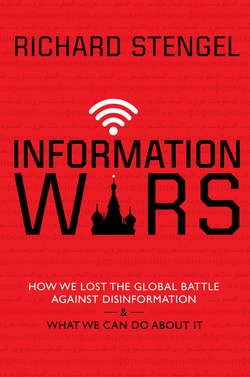Читать книгу Information Wars - Richard Stengel - Страница 24
На сайте Литреса книга снята с продажи.
Wrong Foot
ОглавлениеMy first day began in an inauspicious way. The calendar said my first official meeting as Under Secretary of State for Public Diplomacy and Public Affairs of the United States of America was with the Russian Special Envoy for Cultural Cooperation, Mikhail Shvidkoy, the country’s highest public diplomacy official.
Umm, how did this come about? I asked my acting chief of staff.
Well, the envoy “happened to be in the Building,” she said, and both the European bureau and public affairs thought it made sense for me to see him while he was here. After all, she said, the two of you are the co-chairs of the Bilateral Presidential Commission Working Group on Education, Culture, Sports, and Media.
I felt awkward about this. Our relations with Russia were at a sore point. The much-heralded “reset” had proved a bust. I asked my chief of staff, Was this meeting going to send a message one way or another? Should I punt? Everyone told me that I was overthinking it, and canceling it would be worse.
I was given a BCL on the meeting. BCL is short for “briefing checklist,” This is the top of the BCL:
Under Secretary Stengel’s Meeting with Russian Federation’s Special Envoy for Cultural Cooperation Mikhail Shvidkoy
Your first meeting with Shvidkoy (Shh-vit-koy) is an opportunity to begin a strategic relationship with Russia’s most senior public diplomacy official. Your overarching objective is to establish a relationship that enables us to advance a more positive U.S.-Russia agenda through people-to-people relations with Russia.
The memo went on to talk about “key objectives” and then came the part of traditional State memos that I always liked best: “Watch Out For.” Here the memo said the Russians wanted to repatriate the remains of the Russian pianist Sergey Rachmaninoff and would float a proposal about Fort Ross in California.
I also got a bio of Shvidkoy. He sounded like he might be entertaining. He had written three books on the theater, and was the host of two television shows.
We met in a nondescript conference room off my office because he would be bringing a number of staff and therefore I would have to as well. At State, we always mirrored the number of aides that the foreign official had. He had three, and so did I.
Shvidkoy looked a lot like Nikita Khrushchev—short, stocky, bald. He was bumptious and impatient. After the perfunctory handshakes, our two teams took their seats on opposite sides of the long, rectangular table.
We got off on the wrong foot, not because of personality but because of policy. Just before the meeting, we had received word that our annual bilateral cultural meeting with the Russians—the U.S.-Russia Bilateral Presidential Commission Working Group for Education, Culture, Sports, and Media, which the Russians apparently loved—had been canceled by the White House because of Russia’s behavior in Ukraine. I thought it best not to sugarcoat this, and I announced it right at the top. Russian diplomats never show surprise. I could have announced that President Obama was inviting President Putin to be his partner on Dancing with the Stars, and they would have just nodded, expressionless. Shvidkoy barely acknowledged what I had said and did not bring it up again. Russians are from the “never apologize, never explain” school of diplomacy.
The primary issue they wanted to talk about was Fort Ross, which had been the one and only Russian colony in the contiguous United States. In 1812, a Russian American shipping company chartered by the czar built a settlement about 90 miles north of San Francisco. The settlers planted crops, bred livestock, and constructed a simple Russian Orthodox chapel. But by 1841, their plans changed, and they sold the fort. Decades later, California turned Fort Ross into a park. In 2009, California was considering closing the park, and the Russian Ambassador Sergey Kislyak met with then California Governor Arnold Schwarzenegger and implored him to keep it open.1 Now Shvidkoy was advocating that it become part of the National Park Service, which would protect it. This was a pretty remote possibility, as either the President would have to issue a proclamation under the 1906 Antiquities Act, or Congress would have to pass a bill establishing it as a national monument. Right then, no one was looking to do the Russians any favors.
When I explained that this was very unlikely, Shvidkoy launched into a speech. He said Russia had “sovereignty” over Fort Ross because of “history” and certain “rights.” Mr. Shvidkoy was clearly unhappy with my answer and seemed to imply that Russia should just annex it. That didn’t seem like a good plan. I looked around the room, and all my State colleagues were stone-faced. Is that what diplomacy is? Listening to crazy stuff and not acknowledging it?
After his speech, Shvidkoy seemed to lose his energy and switched abruptly to the Rachmaninoff case. Rachmaninoff was a great Russian artist, he said, and his remains should be sent back to the homeland. When he finished, I said that the State Department didn’t have any jurisdiction over the remains of the pianist and that he would need to take it up with the Rachmaninoff estate. That seemed to be enough for Mr. Shvidkoy. He looked at his watch, glanced at his colleagues, stood up, shook my hand, and then they all filed out. If he was playing the part of the gruff, humorless unbending Russian apparatchik, it was a flawless performance.
